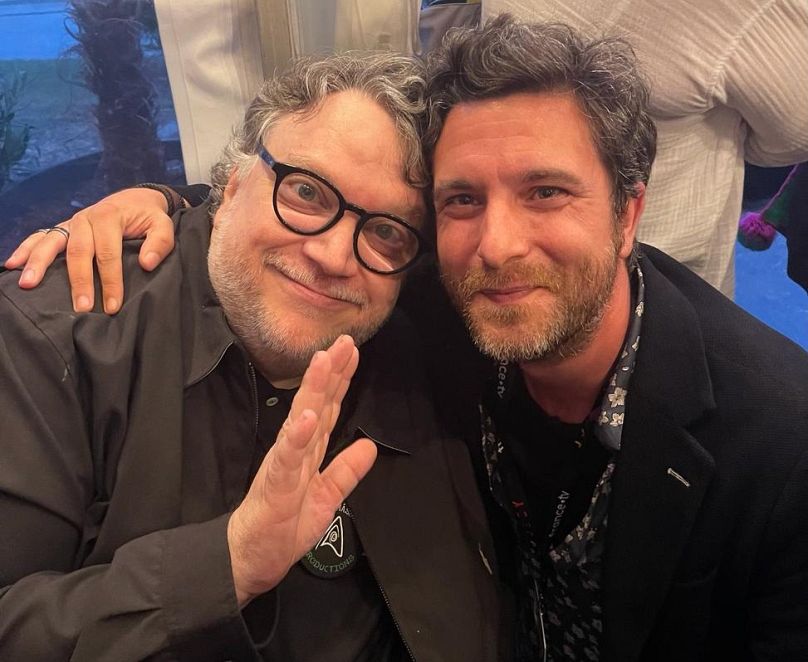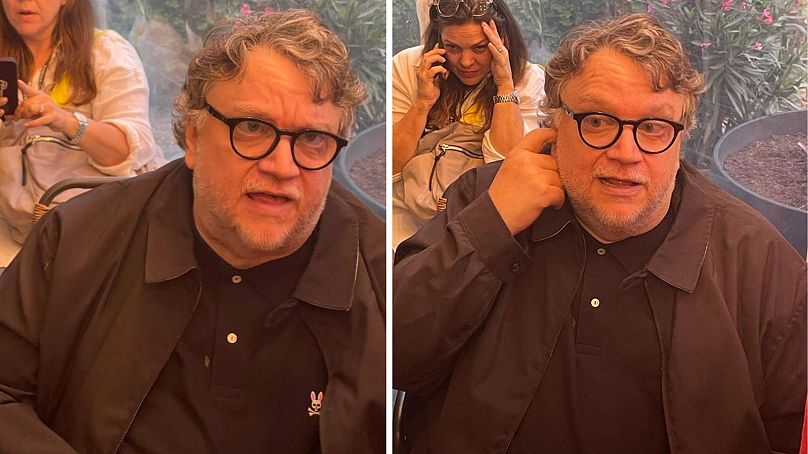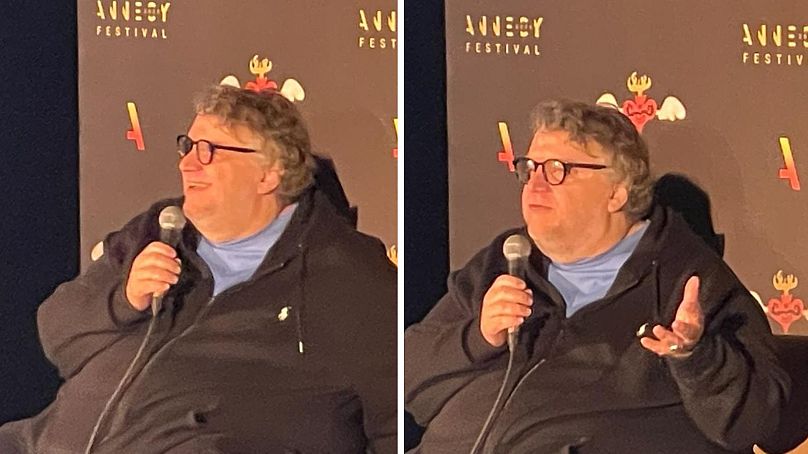Guillermo del Toro on leaving live-action films behind and calling out the film industry

Disclaimer: This article contains Oscar-winning director Guillermo del Toro dropping a fair few f-bombs.
This year’s Annecy Animation Film Festival, which runs until tomorrow evening, has elected to put the spotlight on Mexican animation within its exceptional and diverse programme.
To mark the occasion, award-winning The Book of Life director and animator Jorge R. Gutierrez was asked to design the official poster for the event, and Mexican animation has been the subject of several masterclasses over the week, which we had the pleasure of attending.
And who better to lead several of these masterclasses than the celebrated director Guillermo del Toro, the man behind acclaimed films like Hellboy, Pan’s Labyrinth, Nightmare Alley and the Oscar-winning films The Shape of Water and Pinocchio?
Animation was del Toro’s first love, as he highlighted in Annecy while recounting his early beginnings in the genre, using his father’s Super 8 camera. And considering what he told us during two stellar masterclasses, it will be his last.
Indeed, after his Best Animated Picture Oscar win for Pinocchio, the director said that he only has a few live-action feature films left in him, affirming that he prefers to focus on animation.
“There are a couple more live-action movies I want to do but not many,” said del Toro. “After that, I only want to do animation. That’s the plan.”
The 58-year-old director’s pivot to full-time animation is one to be celebrated, and it clearly means the world to him, as listening to del Toro speak about his beginnings in Guadalajara, sharing numerous anecdotes and communicating his love for the animation medium is truly addictive. And often very funny.
He shared that cash-strapped beginnings meant cutting costs, including on food (“We found out that the cheapest food was dog food – it’s full of calcium, so we had dog food and all the money we saved we used to buy a lens or a new light”), his undying respect for his special effects tutor and "make-up teacher” Dick Smith (The Godfather, The Exorcist), and how his then soon-to-be father-in-law told him that he believed that people in the movie business were “very indecent” - to which del Toro replied: “I am a decent man, I will make my puppets out of clay – there’s very little room for cocaine!”
He also recounted how his first movie was supposed to be a stop-motion film, and how that plan went down the tubes when vandals burglarized the studio and destroyed the hundreds of puppets and sets, thereby putting an end to his original dream and making the young filmmaker switch to live-action – his debut film Cronos.
He’s now getting his second shot.
The “sandwich of shit”
Even if you’re a two-time Oscar winner and considered a filmmaking legend, don’t think for a single moment that his hands aren’t tied.
Del Toro called out the film industry for being “geared toward grinding out shit and destroying your art”, revealing that five of his projects were turned down by studios in the last two months.
“In the last two months, they said no to five of my projects,” he shared with the Annecy audience. “So it doesn’t go away. Making movies is eating a sandwich of shit.”
“There’s always shit, just sometimes you get a little more bread with yours,” he said, painting quite the visual culinary image.
He added: “The rate of productivity against your efforts will remain frustratingly difficult, and frustratingly long. And you will always encounter assholes. But have faith in the stories you want to tell and wait until someone wants to buy them.”
As candid as he is about the industry gatekeepers and moneymen, it all comes back to passion with del Toro. During his talks in Annecy, del Toro stressed how stop-motion is “the most beautiful form of animation because it’s the most intimate.”
“There is always a strong connection between the animator and the physical model,” he continued, adding: “Animation is for the undomesticated spirits. Animation is saying fuck you to the world as it was presented to you as a kid. Don’t stop saying fuck you to the world. Keep saying it until you crash. That’s the important thing about monsters. I love them because they represent a corporal fuck you to the world.”
Del Toro also emphasized how animation is a collaborative medium, and the importance of passing on knowledge so that future generations can help keep the artform alive.
“If you love animation and don’t just love yourself, then teach it, share it. If you have it, share it. We’re a bunch of crazy fuckers trying to keep an ancient form of magic alive. So share it and pass it on.”
He talks the talk, but also walks the walk. Rare are directors like del Toro who are so full of love, humour and generosity. During the whole festival, it was a delight to watch him take the time to talk to audience members, to greet them and hear projects from young filmmakers and animators.
In his second seminar this week, he told students and animators in the audience that they are not alone and connected to the world, emphasizing the need for this big hearted community to pull together, share resources and appreciate what others are doing in the field.
“This is what’s great about Annecy – you're not alone, you’re part of a community of freaks. It’s fantastic – take advantage of it!”
Heartwarming though that undoubtedly is, if an Oscar winner like del Toro gets his projects nixed, what hope do others have?
A sobering and rather depressing thought.
However, thank the animation gods for festivals like Annecy. It’s an event that not only celebrates the very best of animation but gives a sizeable platform to up-and-coming talents who need the exposure in order to establish their voices on a larger, international scene.
Still, if you are still reeling (like we are) at the fact we’re not getting one or more of his dismissed five projects (we’re still waiting for the Mexican maestro’s long rumoured adaptation of H.P. Lovecraft’s ‘At the Mountains of Madness’), prepare yourself for more expletives...
Not just for the kids & taking over the asylum
The Mexican director insisted that the animation medium is not just for the younglings.
“I believe you can make an adult fantasy drama with stop-motion and move people emotionally,” he said. “I think stop-motion can be intravenous, it can go straight to your emotions in a way that no other medium can.”
While acknowledging that recent string of animated box office success stories like Spider-Man: Across the Spider-Verse and The Super Mario Bros. Movie – as well as citing Teenage Mutant Ninja Turtles: Mutant Mayhem, which premiered in Annecy and hits cinemas in August – have helped the genre and give it “a little more latitude”, del Toro stressed that “there are still big fights to be had.”
Indeed, he did not mince his words with regards to Hollywood and big studios, affirming that animation is the purest form of art and that it has been “kidnapped by a bunch of hoodlums” - seemingly referring to mainstream animation studios which avoid risks with an endless barrage of easily consumable fare.
“We have to rescue it. I think that we can Trojan-horse a lot of good shit into the animation world.”
His Trojan horse analogy is apt, as there is still a long way to go for animation to be considered on par with live-action features. Much like horror has been considered the runt of the genre litter in Hollywood for decades and is experiencing something of a reappraisal by major studios, animation needs to gain a further appreciation. Not by the audience, mind you. The Annecy Film Festival attests to the passion and excitement that surrounds animation, with some of the most vocally appreciative and utterly delightful viewers you’re likely to meet and share screenings with. Animation needs to be granted a seat at the big boys table by an industry that consistently sets up roadblocks.
“We’re still being kept at the fucking children’s table in the industry,” commented del Toro. “We have to fight to change that – to take over the asylum and then run it! (...) That’s why festivals like Annecy are so important.”
Fear “emoji-style” animation, not AI
The director stated that “emoji-style” animation where everyone is “happy and sassy and quick” only goes so far. As opposed to commercial animation, he prefers to see “real life in animation” and believes that there’s not a moment to lose.
“I think it’s urgent to see real life in animation. Emotions are codified into a sort of teenage rom-com, almost emoji-style behaviour. (If) I see a character raising his fucking eyebrow, or crossing his arms, having a sassy pose — oh, I hate that shit. Why does everything act as if they’re in a sitcom? I think is emotional pornography. All the families are happy and sassy and quick, everyone has a one-liner. Well, my dad was boring. I was boring. Everybody in my family was boring. We had no one-liners. We’re all fucked up. That’s what I want to see animated. I would love to see real life in animation. I actually think it’s urgent.”
Another warning del Toro issued was against corporate stupidity, not artificial intelligence, as many as decrying.
“When people say they’re scared of AI, I say don’t be afraid of any intelligence; be afraid of stupidity,” shared del Toro. “Every intelligence is artificial. Stupidity is natural. Completely, 100 percent natural, organic. Be afraid of stability. That’s the real enemy.”
That being said, he stressed how he tries to avoid digital sets and effects as much as possible: “I think that we need things that we know are made by humans to recover the human spirit. I love things that look handmade. I fucking hate perfection.”
He concluded, with reference to studio speak: “I think when somebody calls stories ‘content,’ when somebody says ‘pipeline,’ they’re using sewage language.”
Preach, maestro.
Regarding those live-action movies still left in him, Guillermo del Toro is supposed to shoot his long-gestating passion project Frankenstein this summer (all depending on the ongoing writer’s strike). Oscar Isaac, Mia Goth and Andrew Garfield are attached to the project.
He’ll also be returning to Netflix for his next stop-motion adventure, the animated adaptation of Kazuo Ishiguro’s novel, ‘The Buried Giant’. The book follows an elderly couple living in a fictional post-Arthurian England in which no one can retain their long-term memories. Del Toro plans to shoot the film using the same stop-motion technique he used on Pinocchio. And considering the stunning craft on show in this Oscar-winning film, you can bet The Buried Giant will only cement why we’re lucky del Toro is choosing to focus on animation.
After all, the striking and fantastical worlds of Guillermo del Toro deserve to not be shackled by the real world – especially when animation can do so much more.
He knows it. Annecy understands it. And it’s time everyone else gets it.



No comments:
Post a Comment